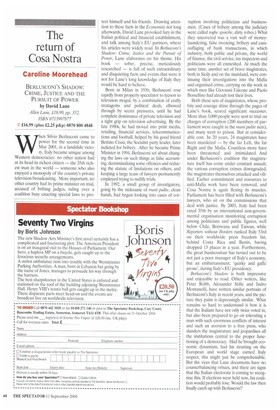The return of Cosa Nostra
Caroline Moorehead
BERLUSCONI'S SHADOW: CRIME, JUSTICE AND THE PURSUIT OF POWER
by David Lane Allen Lane, £18.99, pp. 352, ISBN 0713997877 £16.99 (plus E2.25 p&p) 0870 800 4848 When Silvio Berlusconi came to power for the second time in May 2001, in a landslide victory, Italy became unique among Western democracies: no other nation had at its head its richest citizen — the 35th richest man in the world — someone who also enjoyed a monopoly of the country's private television broadcasting. More important, no other country had its prime minister on trial, accused of bribing judges, ruling over a coalition busy enacting special laws to pro tect himself and his friends. Drawing attention to these facts in the Economist not long afterwards, David Lane provoked fury in the Italian political and financial establishment, and talk among Italy's EU partners, where his articles were widely read. In Berlusconi's Shadow: Crime, Justice and the Pursuit of Power, Lane elaborates on his theme. His book — sober, precise, meticulously researched — is full of such extraordinary and disquieting facts and events that were it not for Lane's long knowledge of Italy they would be hard to believe.
Born in Milan in 1936, Berlusconi rose rapidly from property speculator to tycoon to television mogul, by a combination of crafty stratagems and political deals, elbowed through by secret pressures, until he had complete dominance of private television and a tight grip on television advertising. By the late 1980s, he had moved into print media, retailing, financial services, telecommunications and football, helped by his good friend Bettino Craxi, the Socialist party leader, later indicted for bribery. After he became Prime Minister in 1994, Berlusconi set about changing the laws on such things as false accounting, decriminalising some offences and reducing the statute of limitations on others, and keeping a large team of lawyers permanently employed trying to nullify trials.
In 1992, a small group of investigators, going by the nickname of mani pulite, clean hands, had begun looking into cases of cor ruption involving politicians and businessmen. (Cases of bribery among the judiciary were called toghe sporche, dirty robes.) What they uncovered was a vast web of moneylaundering, false invoicing, bribery and camouflaging of bank transactions, in which industry, both public and private, the world of finance, the civil service, tax inspectors and politicians were all enmeshed. At much the same time, another set of brave magistrates, both in Sicily and on the mainland, were continuing their investigations into the Mafia and organised crime, carrying on the work in which men like Giovanni Falcone and Paolo Borsellino had already lost their lives.
Both these sets of magistrates, whose probity and courage shine through the pages of Lane's book, scored significant successes. More than 3,000 people were sent to trial on charges of corruption (200 members of parliament were caught in the mani pulite nets), and many went to prison. But at considerable cost. In 20 years, 24 magistrates have been murdered — by the far Left, the far Right and the Mafia. Countless more have been threatened and intimidated. And under Berlusconi's coalition the magistrature itself has come under constant assault, the various corruption crimes downgraded, the magistrates themselves attacked and vilified. Earlier commitment and resources to anti-Mafia work have been removed, and Cosa Nostra is again flexing its muscles. Parliament has been filled with Berlusconi's lawyers, who sit on the commissions that deal with justice. By 2003, Italy had been rated 35th by an international non-governmental organisation monitoring corruption among politicians and public figures, well below Chile, Botswana and Taiwan, while Reporters without Borders ranked Italy 53rd on their worldwide press freedom list, behind Costa Rica and Benin, having dropped 13 places in a year. Furthermore, the great businessman has turned out to be not just a poor manager of Italy's economy, but an embarrassment, 'quirky and gaffe prone', during Italy's EU presidency.
Berlusconi's Shadow is both impressive and enjoyable to read. Other writers, like Peter Robb, Alexander Stille and Indro Montanelli, have written similar portraits of Berlusconi's Italy in recent years, and the picture they paint is depressingly similar. What remains so hard to understand is how it is that the Italians have not only twice voted in, but also been prepared to go on tolerating a man with such enormous conflicts of interest and such an aversion to a free press, who slanders the magistrature and jeopardises all the institutions central to the proper functioning of a democracy. Had he brought economic dynamism, had his strutting on the European and world stage earned Italy respect, this might just be comprehensible. But the vices that Lane documents have no counterbalancing virtues, and there are signs that the Italian electorate is coming to recognise this. If elections were held now, his coalition would probably lose. Would the law then finally catch up with Berlusconi?










































































 Previous page
Previous page